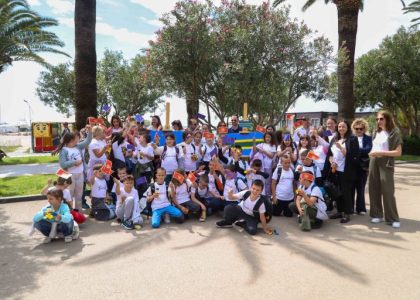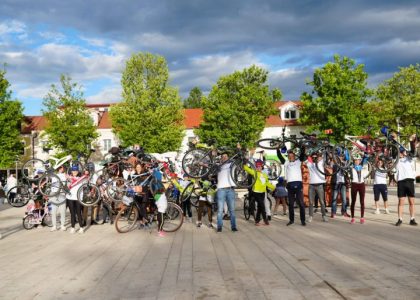Head of EU Delegation to Montenegro, Ambassador Oana Cristina Popa and Chief Negotiator Zorka Kordić signed today a Financing Agreement on EU assistance to the health sector in the fight against Covid-19. This non-repayable EU assistance, worth EUR 9.5 million, is aimed at supporting the health sector in the aftermath of the current health crisis and making it more resilient to cope with similar threats in the future. This means investing in infrastructure, equipment and human capacities of the Montenegrin health system to control diseases and address health security.

Ambassador Popa stressed that the EU assistance contracted today would bring long-term benefits to the Montenegrin health system and the quality of health services offered to citizens. “This health crisis, no matter how challenging, will pass, but the clinics and laboratories will stay. We want to look to the future and continue improving Montenegrin health system by bringing it closer to European standards. This is what Montenegro deserves and it is the very essence of the integration process – improving the quality of life of citizens,” said the EU Ambassador.
Chief Negotiator Zorka Kordić stated that Montenegro’s European perspective has been strengthened by this structured, targeted and valuable support to Montenegro’s healthcare system, emphasizing that the EU was among the first to recognize the need to help not only in this area, but also in addressing the long-term economic and social consequences of the pandemic.
“Together with the EU, we are creating a sustainable healthcare system: the allocated total of 15.5 million euros, covered by the IPA2018 Financing Agreement, will fund 7 actions whose implementation will raise the quality of services to the European level, and ensure that our citizens are satisfied with the healthcare services provided,” Kordić said.

She pointed out that the EU accession process has a transformative character and is in function of the society reform and the development of institutions, knowledge and skills, adding that the implementation of these kind of projects makes the process tangible and beneficial to citizens in the long run.
Minister of Health Jelena Borovinić-Bojović emphasized that the pandemic has once again warned humanity that no one is safe, until everyone is.
“And, in that sense, the hand of support and assistance that the EU has generously extended once again is another point in favour of how important unity and togetherness are in solving this global problem. This is why I want to emphasize the importance of this type of assistance in terms of future functioning, growth and maturing of Montenegro’s healthcare system. The pandemic is here, but one day it will pass, and everything that was provided to us today through the EU’s solidarity and great support will remain,” said Borovinić-Bojović.

This financing agreement envisages the purchase of PCR equipment capable of analysing a large number of respiratory samples for the detection of COVID-19, which will increase the national capacity for coronavirus testing and detection.
Various facilities will be constructed to host medical structures important for the prevention and control of contagious diseases, and for the treatment of the patients. The EU has earmarked a total of EUR 8.5 million, including EUR 4 million from this package and EUR 4.5 million from the previously allocated funds, for the construction of the Clinics for Infectious Diseases and Dermato-venereology. EU funds will be also used to build a Centre for Control and Prevention of Infection Diseases with an Emergency Operating Centre and the first Biosafety Level 3 laboratory, while several microbiology laboratories will be refurbished and equipped.
As immediate support to Montenegro to deal with the ongoing pandemic, the funds are allocated to implement an effective and coordinated communication and community engagement strategy to respond to COVID-19 and mitigate the impacts. In addition, the EU will work together with UNICEF, to improve the vaccine management system, ensure continuity of immunization services and increase immunization coverage.
The EUR 9.5 million package, signed today, is part of a broader EU programme, worth EUR 53 million of non-repayable financial aid that the EU is providing to Montenegro. A significant part of the aid programme, EUR 40.5 million, is allocated as direct support to the state budget for mitigating the economic fallout of the pandemic and supporting the authorities’ social and economic response. In November 2020, the EU paid a first instalment of the budget support, worth EUR 28 million. Under the same programme, 100 ventilators, 10 digital x-ray machines, and more than 2 million pieces of protective equipment were provided during 2020, helping health workers to be safe, while taking care of those in need.
All Western Balkans countries, including Montenegro, have joined the COVAX Facility to secure access to vaccines procured at a negotiated price. Furthermore, in December 2020, the EU allocated EUR 70 million of EU pre-accession funds to purchase vaccines for the Western Balkans. This money is available for grant agreements with EU Member States through a set of special resale agreements. In its Communication of 19 January 2021, the Commission is committing to setting up an EU vaccine sharing mechanism, with special attention given to the Western Balkans.


